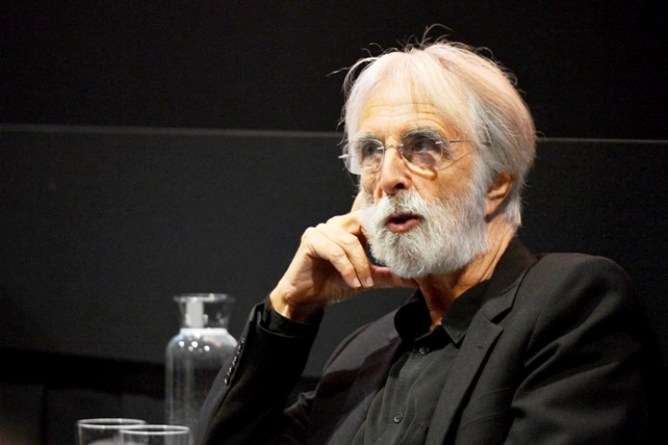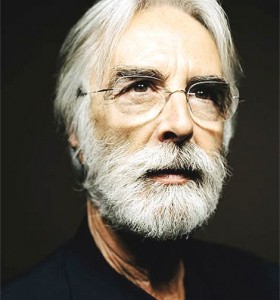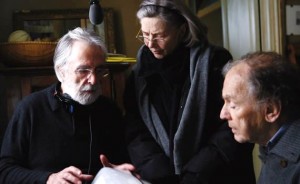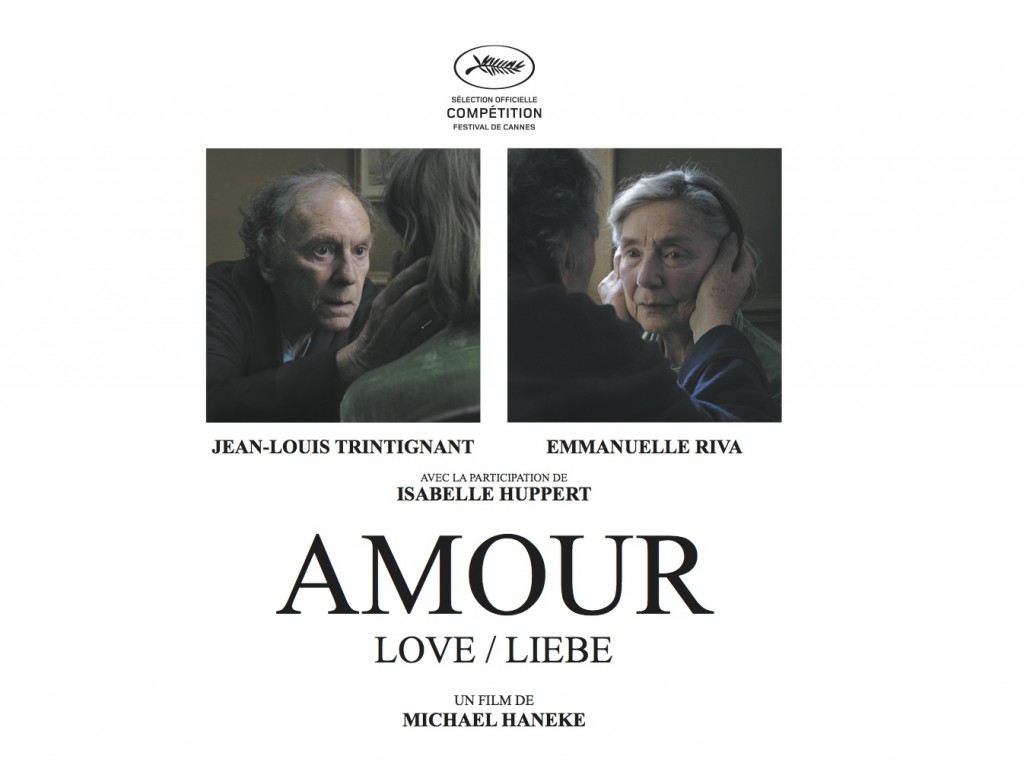
Amour (Austria) is the merciless and over-powering new film by Michael Haneke, an unmistakably intellectual filmmaker who has incidentally made his most emotional film. His meticulous mise-en-scéne and long takes are still in practice, but the esteemed director is definitely aided by two extraordinary actors in their twilight, Jean-Louis Trintignant and Emmanuelle Riva. The husband fatigued but not helpless looks on as his wife follows a stroke with further immediate debilitations. This is a somber and stark look at the impending death of a loved one. Only Ingmar Bergman’s “Cries and Whispers” (1973, Sweden) looked at sickness with such unbroken gaze.
Haneke was at The Beverly Wilshire Hotel in Los Angeles to discuss the film at a press conference. “Amour” won the Palm d’Or at the Cannes Film Festival (Haneke also won this top prize in 2009 for “The White Ribbon”), and will likely continue to win Best Foreign Film awards around the industry circuit. This is his 12th major feature film, and according to not just me, his best one.
 Why did you feel this was an important film to make?
Why did you feel this was an important film to make?
Haneke: Like so many of us… I was confronted with a situation in my family where someone I loved very deeply was ill and I had to look on helplessly at their suffering. It was a very moving experience, it was one of the worst experiences you can go through. That was the catalyst then to make the film. But to avoid any possible misunderstandings I would like to point out that my personal story has nothing to do with what is actually presented on the screen.
Didn’t you have a fear of shooting an entire film in one enclosed location?
Haneke: Not when I was on-set. But when I began to write the project, I recognized the challenges. It is much harder to write a script that involves two people in a single location than twenty people in thirty different locations. But I enjoyed meeting that challenge. In fact, it’s more enjoyable to shoot in a studio on a single location with two actors. If they are good!
What kind of rehearsal process did you conduct with the actors?
Haneke: They spent next no time together prior to shooting. The three of us met in Paris three or four times to have lunch to talk about the project. Jean-Louis came over to my apartment one afternoon to discuss the script. In fact, we talked about everything but the script. They are both experienced and highly professional actors, I assume they know how to read a script and prepare a part. I don’t rehearse ever with professional actors. When I am working with children or non-pro actors I do. But when you’re working with actors this good I simply ask them to show up to set.
What happens on shooting day without rehearsal?
Haneke: We go through blocking and movements, and start shooting. If I’m not satisfied with the results, we try something else and keep shooting until we got what I need. What’s important as a director is to make your actors feel protected, feel confident, and the feeling that if they make mistakes, you as a director can help them. If you’re able to convey that, then the actors will give you wonderful performances. Your highest responsibility is giving them a good script. You still have to write scenes that give actors the opportunity to show what they are capable of.
Was there any ad-libbing?
Haneke: No ad-libbing at all. We are publishing in Germany and France the original script so people can compare what’s on screen is exactly what I had written.
The scene where the husband slaps his wife, you follow it with cuts to a series of paintings. One of them comes to life. Do those shots have to mean anything specific, or is it open to interpretation?
Haneke: All the things you mention, the paintings but also the pigeons, are open to interpretation. In fact, that’s why they’re in the film. Meant to confront the audience, to invite the audience to think about these questions. For that reason it would be counter-productive if I were to impose a rigid single meaning on those elements.
 Was this a difficult shoot in comparison to your other film experiences?
Was this a difficult shoot in comparison to your other film experiences?
Haneke: There were any number of scenes that were difficult because of the emotional content. But that wasn’t the only difficulty. In fact, many scenes required inordinate concentration. There were as much technical difficulties as physical difficulties. There were a number of scenes where Jean-Louis was quite unsteady on his feet. For instance, it was hard for him to do the scene with the pigeons. It was difficult for him because he has to react to the pigeon and it took two days. We laid down seeds on the ground in hope the pigeons would come in a certain direction, but you can’t direct pigeons!
Any particular hardships for Emmanuelle?
Haneke: The hardest scene for Emmanuelle was that with the electrical wheelchair. She was scared to operate it. Afraid she couldn’t control it. That was the only scene we rehearsed.
Is there a reason an Austrian as yourself chose to shoot this film in France?
Haneke: There were several reasons for shooting the film in French. France’s numbers, the quantity of actors and work with them, is no different when I work with Austrian actors. But here are the reasons: Some of the actors in France are famous around the world which isn’t the case in Germany or Austria. And there is more money available in France for more challenging films.
Other films have dealt with the theme of love, but not like this one. Do you compare your project with other “love” films before you get started?
Haneke: When I’m working on a film it never concerns me if the theme has been done before or not. I’m led to make films with themes or ideas that interest me. I experience something in my own life that confronts me with something I want to deal with. It’s the theme that interests me and motivates my desire to explore it.
What films interest you the most as a moviegoer?
Haneke: I’m interested in seeing films that confront me with new things. Films that make me question myself. Films that help me reflect on subjects that I haven’t thought about before. Films that help me progress and advance. Those are the kinds that interest me. For me, watching a movie that simply confirms my feelings is a waste of time. That not only applies to movies, but to books and every form of art…
Any films specifically touch you in recent years?
Haneke: That’s a very dangerous question because if I cite one film, then ten other filmmakers will be angry!
What gives you the most satisfaction as an artist?
Haneke: In terms of cinema, it’s certainly the gifts the actors bestow unto you, that enhance and transform your film. Unexpected gifts.





